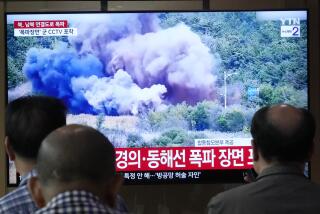Peacekeepers in Bosnia Cut Rail Line at Border
- Share via
SARAJEVO, Bosnia-Herzegovina — Troops of the U.S.-led Bosnian peacekeeping mission blew up a key stretch of railway on the Yugoslav border Saturday to block Yugoslav military movements through Bosnia into Montenegro, where Western leaders have said President Slobodan Milosevic may be plotting a coup.
The decision to cut the rail line was the first time that the multinational Stabilization Force here, or SFOR, has acted in a way that could influence the conflict in Yugoslavia since NATO bombings of that country began 11 days ago. It was met with immediate hostility by the Bosnian Serb leadership, which is sympathetic toward the Yugoslav Serbs.
SFOR’s preemptive destruction of tracks near the town of Rudo on Bosnia’s eastern border can be expected to enrage Russia, which had already threatened earlier Saturday to withdraw its 1,300-plus troops from SFOR to protest NATO’s overnight bombing of military targets in Belgrade, the Yugoslav and Serbian capital.
SFOR comprises forces from 37 countries and has pointedly noted its independence from the NATO operations since airstrikes against Yugoslavia began March 24 to pressure Milosevic into halting the killing and expulsion of ethnic Albanians in the Serbian province of Kosovo.
NATO planes enforcing a “no-fly” zone over Bosnia shot down two Yugoslav MIG-29 aircraft a week earlier, but those planes had clearly penetrated the protected airspace and were perceived as having “hostile intent” toward the Bosnia-based mission.
Severing the rail link at its short, five-mile incursion into Bosnian territory was “a prudent, precautionary measure to deny military forces of the Federal Republic of Yugoslavia entry into and transit through Bosnia,” Gen. Montgomery Meigs, the U.S. commander of SFOR, told journalists at a news conference to discuss the action that pushed his mission to the limit of its mandate.
“SFOR will not allow this railway, which runs from Serbia through Bosnia-Herzegovina to Montenegro, to be used for military purposes,” Meigs said with determination.
SFOR had information that the railway, one of two key lines linking Belgrade and Montenegro, was being used or was soon to be used to transport foreign armed forces through Bosnia in violation of the 1995 Dayton, Ohio, peace agreement, said Col. Lee Hockman, SFOR’s information chief.
Mirko Sarovic, acting president of the Bosnian Serb entity in this still-divided country, condemned the destruction of the rail link as “uncivilized, inhumane and anti-Dayton.”
SFOR troops who blew up the tracks with a controlled explosion about 8 a.m. were shot at by two men in civilian clothing with AK-47 assault rifles and returned fire, Meigs said, adding that no casualties were sustained by SFOR.
Meigs contended that the peacekeeping mission based here had no information on the fate of the two assailants, but Rudo Mayor Rato Rajak was quoted by the Bosnian Serb news agency SRNA as saying that a Serb guarding the rail line, Vidoje Tomic, was killed in the exchange of gunfire.
“Because local citizens are embittered, we cannot guarantee the security of members of SFOR,” Rajak stated in a coded warning that hostile Milosevic allies might seek revenge against the foreign peacekeepers.
Bosnian Serb radio reported that an SFOR Portuguese unit in the Serb-held town of Rogatica was replaced by U.S. and German soldiers after the railway action.
Bosnian Serbs had already been conducting daily rallies against the North Atlantic Treaty Organization and the vestigial presences in Bosnia of the countries they see as chief players in the air war against Yugoslavia, forcing U.S., British and other Western governments to withdraw from diplomatic and aid missions in hostile cities such as Banja Luka and Brcko.
The section of the railway destroyed by SFOR will be repaired “upon the cessation of current hostilities,” Meigs said, referring to the NATO assaults on Yugoslavia.
Western governments had been warning for two days that Milosevic might be preparing a coup against the moderate president of Montenegro, Milo Djukanovic. The Montenegrin leadership in Podgorica has refused to mobilize troops for the deadly Yugoslav campaign against Kosovo Albanians and has distanced itself from Belgrade’s declared state of war with NATO.
Milosevic last week removed several generals loyal to Djukanovic from the armed forces stationed in Montenegro, the smaller of Yugoslavia’s two remaining republics, and replaced them with hard-liners committed to Milosevic’s nationalist cause.
As the SFOR operation to block the rail line was underway, British Air Commodore David Wilby warned that NATO had mounting evidence that Montenegrin moderates were under threat.
“There is growing evidence in Montenegro that President Milosevic may be planning a coup against the existing, legitimate government,” Wilby said.
French Foreign Minister Hubert Vedrine also issued a statement, cautioning Belgrade against “any attempt at destabilizing” Montenegro.
More to Read
Sign up for Essential California
The most important California stories and recommendations in your inbox every morning.
You may occasionally receive promotional content from the Los Angeles Times.














